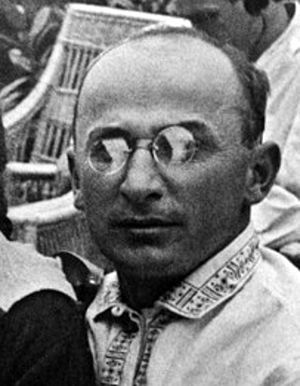Lavrenty Beria facts for kids
Quick facts for kids
Lavrenty Beria
|
|
|---|---|
 |
|
| First Deputy Chairman of the Council of Ministers of the Soviet Union | |
| In office 5 March 1953 – 26 June 1953 |
|
| Premier | Georgy Malenkov |
| Preceded by | Vyacheslav Molotov |
| Succeeded by | Lazar Kaganovich |
| Minister of Internal Affairs of the Soviet Union | |
| In office 5 March 1953 – 26 June 1953 |
|
| Preceded by | Sergei Kruglov |
| Succeeded by | Sergei Kruglov |
| In office 25 November 1938 – 29 December 1945 |
|
| First Secretary of the Georgian Communist Party | |
| In office 15 January 1934 – 31 August 1938 |
|
| In office 14 November 1931 – 18 October 1932 |
|
| Personal details | |
| Born |
Lavrentiy Pavlovich Beria
29 March 1899 Merkheuli, Kutaisi Governorate, Russian Empire |
| Died | 23 December 1953 (aged 54) Moscow, Russian SFSR, Soviet Union |
| Nationality | Soviet, Georgian |
| Political party | Communist Party of the Soviet Union |
| Spouse | Nina Gegechkori |
| Awards | Hero of the Soviet Union  |
| Signature |  |
| Military service | |
| Rank | Marshal of the Soviet Union |
| Battles/wars | World War II |
Lavrenty Pavlovich Beria (29 March 1899 – 23 December 1953) was a powerful political figure in the Soviet Union. He was a close helper of Joseph Stalin, who was the leader of the Soviet Union. Beria led the country's secret police for many years. After Stalin died, Beria was arrested and later died in 1953.
Contents
Early Life and Rise to Power
Lavrentiy Pavlovich Beria was born in Merkheuli, a village near Sukhumi. This area was part of the Russian Empire at the time. His family was Georgian Orthodox.
Beria went to a technical school in Sukhumi. He later said he joined the Bolsheviks in March 1917. The Bolsheviks were a political group that later formed the Communist Party of the Soviet Union.
In 1919, when he was 20, Beria started working in state security. He joined the Cheka, which was the original Bolshevik secret police, around 1920 or 1921. The Cheka was very involved when the Red Army took control of Georgia.
Beria helped put down a Georgian uprising in 1924. After this, he took control of the Georgian OGPU, another security agency. He met Joseph Stalin through a party leader named Sergo Ordzhonikidze. This meeting helped Beria become an important ally to Stalin.
Key Roles and Influence
Beria became the First Secretary of the Georgian Communist Party in 1931. He then became the party leader for the whole Transcaucasian region in 1932. In 1934, he joined the Central Committee of the Communist Party of the Soviet Union.
By 1935, Beria was one of Stalin's most trusted people. He gave a long speech praising Stalin's role in the Bolshevik movement. This helped him become even more important.
In March 1939, Beria became a candidate member of the Communist Party's Politburo. The Politburo was a very powerful group that made major decisions. By 1946, he was a full member and one of the top leaders in the Soviet state.
Leading the Secret Police
Beria was the chief of the Soviet security and secret police, known as the NKVD, during World War II. He was also the First Deputy Premier after the war, from 1946 to 1953.
He managed many parts of the Soviet government. His NKVD units worked on the Eastern Front during World War II. They also managed the large Gulag labor camps. Beria was also in charge of secret defense projects called sharashkas, which were important for the war effort.
Beria also helped organize Soviet spies and sabotage missions behind German lines. He went to the Yalta Conference with Stalin. After the war, he helped set up communist governments in Central and Eastern European countries.
The Soviet Atomic Bomb Project
Beria was known for being very determined and getting results. Because of this, he was put in charge of the Soviet atomic bomb project. Stalin made this project a top priority. The project was finished in less than five years. This was partly due to Soviet spies gathering information from Western countries, which Beria's NKVD organized.
Arrest and Death
After Stalin died, Beria was promoted to First Deputy Premier. He tried to make some changes that were more open. For a short time, he was part of a ruling group with Georgy Malenkov and Vyacheslav Molotov.
However, Beria was too confident in his position. Other members of the Politburo did not trust him. Nikita Khrushchev led a plan to remove Beria from power. Beria was arrested during a meeting where the Politburo members spoke out against him. He was accused of treason.
Beria and his associates were put on trial on 23 December 1953. They did not have a lawyer and could not appeal the decision. Beria was found guilty of treason, terrorism, and anti-government activities. He and the others were sentenced to death on the same day. He died immediately after the trial.
Images for kids
-
Lavrenty Beria on the cover of Time magazine, 20 July 1953
See also
 In Spanish: Lavrenti Beria para niños
In Spanish: Lavrenti Beria para niños
 | Laphonza Butler |
 | Daisy Bates |
 | Elizabeth Piper Ensley |


